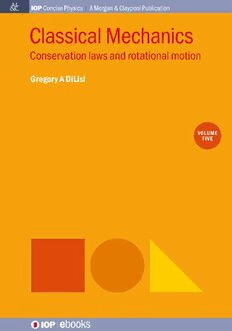
Classical Mechanics, Volume 5: Conservation Laws and Rotational Motion PDF
Preview Classical Mechanics, Volume 5: Conservation Laws and Rotational Motion
Classical Mechanics, Volume 5 Conservation laws and rotational motion Classical Mechanics, Volume 5 Conservation laws and rotational motion Gregory A DiLisi John Carroll University, University Heights, Ohio, USA Morgan & Claypool Publishers Copyrightª2019Morgan&ClaypoolPublishers Allrightsreserved.Nopartofthispublicationmaybereproduced,storedinaretrievalsystem ortransmittedinanyformorbyanymeans,electronic,mechanical,photocopying,recording orotherwise,withoutthepriorpermissionofthepublisher,orasexpresslypermittedbylawor undertermsagreedwiththeappropriaterightsorganization.Multiplecopyingispermittedin accordancewiththetermsoflicencesissuedbytheCopyrightLicensingAgency,theCopyright ClearanceCentreandotherreproductionrightsorganizations. CertainimagesinthispublicationhavebeenobtainedbytheauthorfromtheWikipedia/ Wikimediawebsite,wheretheyweremadeavailableunderaCreativeCommonslicenceorstated tobeinthepublicdomain.Pleaseseeindividualfigurecaptionsinthispublicationfordetails.To theextentthatthelawallows,IOPPublishingandMorgan&ClaypoolPublishersdisclaimany liabilitythatanypersonmaysufferasaresultofaccessing,usingorforwardingtheimages.Any reuserightsshouldbecheckedandpermissionshouldbesoughtifnecessaryfromWikipedia/ Wikimediaand/orthecopyrightowner(asappropriate)beforeusingorforwardingtheimages. Rights&Permissions Toobtainpermissiontore-usecopyrightedmaterialfromMorgan&ClaypoolPublishers,please [email protected]. ISBN 978-1-64327-398-3(ebook) ISBN 978-1-64327-395-2(print) ISBN 978-1-64327-396-9(mobi) DOI 10.1088/2053-2571/ab1cb2 Version:20190801 IOPConcisePhysics ISSN2053-2571(online) ISSN2054-7307(print) AMorgan&ClaypoolpublicationaspartofIOPConcisePhysics PublishedbyMorgan&ClaypoolPublishers,1210FifthAvenue,Suite250,SanRafael,CA, 94901,USA IOPPublishing,TempleCircus,TempleWay,BristolBS16HG,UK This book is dedicated to my family: to my grandparents, Tommaso and Carmela Frate, to my parents, Richard and Mary DiLisi, to my siblings, Rick DiLisi, Carla Solomon, and Jennifer Newton, to my wife, Linda, to my daughter, Carmela, and to the wonderful creatures who inhabit our home. Contents Preface x Author biography xv Part I Conservation laws 1 Motivation 1-1 2 Getting ready 2-1 2.1 Anticipatory set 2-1 2.2 Objective 2-4 2.3 Purpose 2-4 3 Giving information 3-1 3.1 Instructional input 3-1 3.1.1 Multiplying vectors by scalars 3-1 3.1.2 Multiplying vectors by vectors: the vector ‘dot’-product 3-2 3.2 Modeling 3-4 3.3 Instructional input 3-7 3.3.1 Work or energy 3-7 3.4 Modeling 3-10 3.5 Instructional input 3-12 3.5.1 Work done by a non-constant force 3-12 3.5.2 The ‘work-energy theorem’ or the ‘law of 3-13 conservation of energy’ 3.6 Modeling 3-19 3.7 Checking for understanding 3-23 3.8 Instructional input 3-27 3.8.1 Linear momentum 3-27 3.8.2 The ‘law of conservation of momentum’ 3-30 3.9 Modeling 3-35 3.10 Checking for understanding 3-40 3.10.1 What if an object’s mass changes? 3-40 vii ClassicalMechanics,Volume5 4 Keeping information 4-1 4.1 Closure 4-1 4.1.1 LCE and LCP 4-1 4.2 Independent practice 4-6 4.2.1 The law of conservation of energy 4-6 4.3 Independent practice 4-10 4.3.1 The law of conservation of momentum 4-10 4.4 Peer teaching 4-11 4.4.1 Gravitational potential energy 4-12 4.4.2 Work done by ‘other’ forces 4-12 Part II Rotational motion 5 Motivation 5-1 6 Getting ready 6-1 6.1 Anticipatory set 6-1 6.2 Objective 6-2 6.3 Purpose 6-3 7 Giving information 7-1 7.1 Instructional input 7-1 7.1.1 The Center-of-Mass 7-1 7.2 Modeling 7-8 7.3 Checking for understanding 7-10 7.3.1 Where is the human body’s Center-of-Mass? 7-10 7.4 Instructional input 7-15 7.4.1 The moment of inertia about an axis of rotation 7-15 7.5 Modeling 7-20 7.6 Instructional input 7-23 7.6.1 Multiplying vectors by vectors: the vector ‘cross’-product 7-23 7.6.2 Representing vectors ‘out of’ and ‘into’ this book 7-26 7.7 Modeling 7-30 7.8 Checking for understanding 7-33 7.8.1 All vector operations 7-33 viii ClassicalMechanics,Volume5 7.9 Instructional input 7-35 7.9.1 Torque 7-35 7.10 Modeling 7-40 7.11 Instructional input 7-44 7.11.1 Angular displacement 7-44 7.11.2 Linear-to-angular transformations 7-46 7.12 Checking for understanding 7-51 7.13 Modeling 7-56 8 Keeping information 8-1 8.1 Closure 8-1 8.2 Independent practice 8-4 8.2.1 The Center-of-Mass 8-4 8.2.2 Moment of Inertia 8-7 8.2.3 Torque 8-7 8.2.4 Rotational motion 8-9 ix
